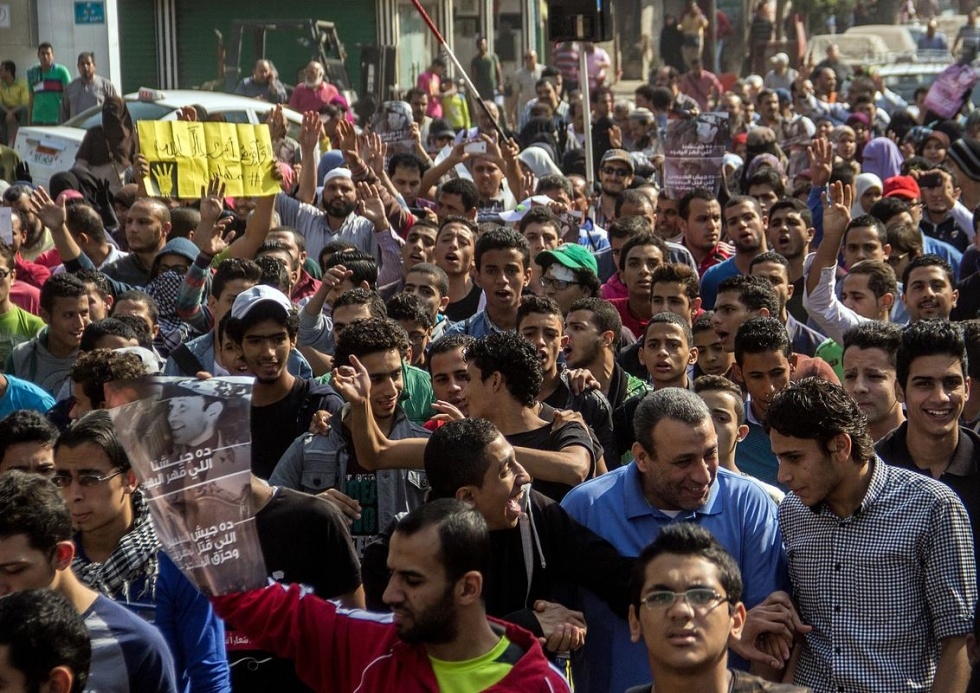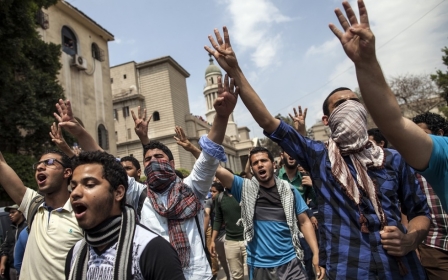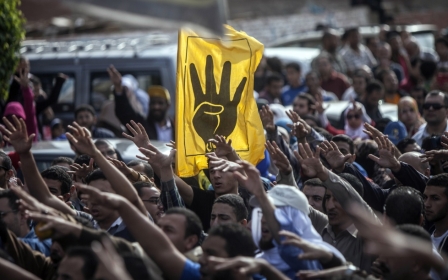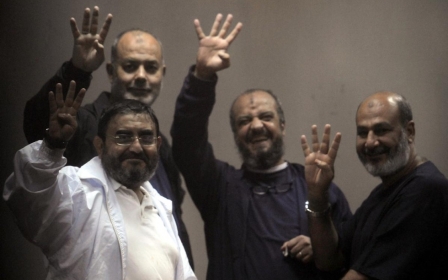Egypt's Islamist youth prepare for 'identity battle'

Egypt is bracing itself for a wave of new ‘Islamist’ protests on Friday 28 November.
The Salafist Front has called for protests dubbed the ‘identity battle’ and ‘the Muslim youth uprising' through which it aims to “restore Islamic identity and Sharia law” in the country, the group declared in statements on their Facebook page.
“Is it not time for the Muslim youth to launch their uprising and declare their revolution? Is it not time for those who began the uprisings to finish it off? Let us launch a revolution to restore our identity,” the group said in statement on 31 October.
Other calls have incorporated broader demands, inviting a larger grassroots base among Egyptians to join the protests.
“It is time for Egypt to return to its heydays. Let the Egyptian labourers and farmers revolt against capitalism and greed of the business elite; let the students stand up for their dignity in the face of the military militias, let a volcano of anger erupt from Sinai against those who have killed our children and soldiers,” the group said in a statement on 22 November.
While the Salafist Front has been at the forefront of the calls, members from several other groups are expected to take part including the Salafist al-Watan and al-Asala parties; the Jamaa Islamiyya – whose leadership issued a statement distancing itself from the plan; as well as the Islamic Jihad and the Muslim Brotherhood.
According to activists involved in organising the protests, the calls were initiated by youth members across Egypt’s Islamist movements, while their leaders have remained distant from officially endorsing the plans.
“Statements made by the leaders do not represent me in any way. It is us [the youth] who are calling for these demonstrations,” said a 26-year-old Ahmed (not his real name), a member of the Muslim Brotherhood.
For Ahmed the aims of the Islamist youth are three-fold: a return of Sharia law, a reclamation of Egypt’s 'Islamic' identity and a redemption for Islamist movements which they see have been the main target of state repression.
“There has been a change in the country’s identity since the coup; bar licenses are cropping up everywhere and Quranic and religious studies are being eliminated from school curricula, while churches have begun a widespread missionary campaign to convert homeless children,” Ahmed told MEE.
Like many Salafist leaders who have backed the calls on an individual level rather than through authorisation of their parties or movements, head of the Salafist al-Asala party Ihab Shiha is supporting the calls and says the youth are reacting to the suppression of Islamist groups.
“The call is from among the youth, they are frustrated with the impotence they see in the face of a crackdown on their Islamic identity.”
“Oppression is rampant; women in niqabs and men in beards are being searched just because of their attire. Female protesters are being dragged by their clothes across the streets and raped in detention centres,” he explained.
“The youth can no longer stand by idly and watch.”
Division or unity?
While during the 2011 uprisings, a broad spectrum of Egyptian opposition groups – secular, Islamist, liberal and leftist – united under a banner of common demands for bread, freedom and social justice, today’s calls seem to resonate less among Egypt’s non-Islamists.
Many of the youth supportive or taking part in the demonstrations however, see the perceived unity of 2011 as an artificial moment that could not have been sustained.
“The unity of the opposition was an insulated instance at a very particular time and not a long-term reality,” said Haitham Ghoneim, an independent Islamist, who left Egypt after being released from a brief period in detention earlier this year.
At the same time, they see the demonstrations as an opportunity for Islamist groups to redeem their position as the vanguards of the revolution and make clear their objectives.
“In 2011, the only groups that compromised on their demands and identity for the sake of unity, were the Islamists. And now we are at the forefront of the of state's clampdown,” Ahmed said.
“It’s time we take back our rights.”
The Front had also called on protesters to carry copies of the Quran, to indicate that “Sharia law is the answer to problems facing society”, stirring controversy among religious and secular groups.
Al-Azhar, the country’s leading religious authority, labelled the calls an “exploitation of religion” and warned the youth against taking part. On Tuesday, al-Azhar announced that it will be sending 244 envoys to warn against "the use of the Quran for political agendas" and "affirm the role of Sharia in unifying and stabilising the country", reported Mada Masr.
While the calls may have been divisive to some, they have also succeeded in unifing others.
Since the military take-over in July 2013, much of the protests have been carried out by the Muslim Brotherhood, with members calling for the return of president Mohamed Morsi, ousted by then general and now President Abdel Fatah al-Sisi. Friday's calls are not factional in that sense.
"Changing the issue to focus on Islamic identity, is a manoeuvre aimed to broaden the number of groups on the ground and include more than namely Morsi supporters," said Mostafa (not his real name), a senior member of the Egyptian Revolutionary Council.
At the same time, student-led activist groups have also announced their participation in Friday's protests.
"We have called on all university students to participate in the protests. We [the students] have always been supportive of any call against the military's oppression and injustice, regardless of who has made the called or what the specific demands may be," said Youssof Salhen, spokesperson for Students against the Coup (SAC), a student-led movement across Egypt's universities.
Furthermore, while secular and liberal oppostion groups are not expected to take part in Friday's protests, Shiha says some individuals who affiliate themsleves with secular and liberal ideologies will be demonstrating as well.
Potential violence
While the leadership of most Islamist groups have strictly adhered to an approach of peaceful demonstrations, Friday’s protesters may not uphold the same principle.
"The way our leaders have maintained peace is wrong; religion doesn't say that," said Ahmed.
"If someone is fighting me using arms, am I to fight back by waving a white flag?" he told MEE.
Senior leaders have forseen this wave of change among the youth.
“There is no question about it, we expect violence to be used,” Mostafa said.
“There has been an on-going discussion between the youth and leaders regarding the use of violence. We have the examples of Syria and Libya; we maintain peace as a strategic decision, but the youth feel disenfranchised and want to build momentum,” Mostafa told MEE.
While many observers believe the youth may use violence as a defensive tactic, violent clashes with security services are are anticipated to be wide-spread.
"We are expecting to witness many deaths and injuries. The state has been preparing itself quite well for tomorrow," said Salhen.
In anticipation of the demonstrations, Egyptian security authorities have raised their alert to the highest degree, arresting leading members of the groups and vowing to harshly confront the protesters.
Minister of interior Mohamed Ibrahim vowed to confront “inciting calls by terrorist groups” that threaten lives and the stability of the nation, state-owned Al-Ahram newspaper reported.
The minister emphasised that any attack on police, armed forces or state facilities will be considered a crime, giving authorities the right to defend themselves by any means, including the use of live ammunition.
In a statement Tuesday Medhat al-Minshawy, head of the special operations unit in the ministry of interior also said, “The police forces will defend themselves and the people against any vandalism during the 28th's protests.”
“We will implement the law upon any terrorist, thief or gunslinger. The people have delegated to us the responsibility of defending them using arms,” he said on television during a daily programme on Tuesday.
Islamic State flags have reportedly been spotted during a preparatory demonstration last Friday in Cairo, signalling a potential build of traction for the group.
"Regardless of how we feel about IS and Ansar Beit al-Maqdis, when the youth see their videos and their victories, they change thier perceptions a bit," said Mostafa.
Egyptian state media has also reported extensively on the measures taken by the authorities in preparation for Friday, which observers say reflects fear among state authorities.
“The response of the security forces shows their alarm and that they are almost scared of this,” Mostafa told MEE.
Ghoneim agrees: “These protests are just like January 25th; the state doesn’t know who is steering the ship or what to expect, he said.
New MEE newsletter: Jerusalem Dispatch
Sign up to get the latest insights and analysis on Israel-Palestine, alongside Turkey Unpacked and other MEE newsletters
Middle East Eye delivers independent and unrivalled coverage and analysis of the Middle East, North Africa and beyond. To learn more about republishing this content and the associated fees, please fill out this form. More about MEE can be found here.




